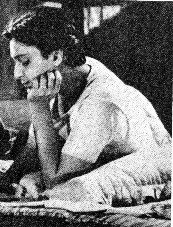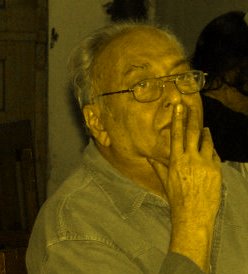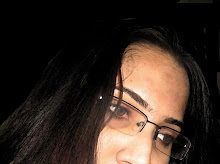Interviewer: Congratulations on the National Award. I know you don't feel it has any value but as a fan, I must say that better late than never. And it doesn't matter what film it is.
Soumitra Chatterjee: Besides, at my age it hardly matters what I get. It is much more important that people who have loved me, tolerated me and nurtured me with their love for 50 years are happy that I am being decorated or whatever you wish to call it.
Interviewer: If you let us peek into your mind, it makes no difference whether you have it (the award) or not?
Soumitra Chatterjee: Not really. Because I have long since lost all interest in these awards because they have so often been given to someone who does not deserve it or to someone who isn't really worth naming. It's not attitude or ego problem, it is simple, reasonable thinking. I feel I have worked in 14 of Mr (Satyajit) Ray's films and I was not considered to be the best actor in any one of them. (laughs)
Interviewer: It's a bit of a joke. You are right.
Soumitra Chatterjee: Yes, it's a joke.
Interviewer: You made your debut as an actor with Satyajit Ray, right?
Soumitra Chatterjee: That's where it all started.
Interviewer: I believe you went for screen test in 1956 for a devotional film and got rejected.
Soumitra Chatterjee: How do you know that?
Interviewer: I did some amount of homework.
Soumitra Chatterjee: Yes, it was some kind of a devotional film. I too have forgotten the name...
Interviewer: Neela Chole Mahaprabhu
Soumitra Chatterjee: Yes! That's right. I was given a screen test and was found not suitable...
Interviewer: Thank God!
Soumitra Chatterjee: Yes, thank God. I was very closely associated with the great Shishir Kumar Bhaduri and so it was almost pre-destined that i should be an actor. I made up my mind when I was doing my graduation. But to be very frank, I never thought I would be a very famous filmstar. In fact, before witnessing the revolutionary change in Indian cinema with Pather Panchali, we had a snobbish kind of disdain for cinema. I did not like the Bengali cinema of those days although I was an avid cinema fan.
Interviewer: In fact, your mentor, Shishir Kumar Bhaduri, was offered a role by Satyajit Ray in Mahanagar and he turned it down saying - and I am quoting him - 'In films, the actor doesn't act, only the director does'.
Soumitra Chatterjee: Yes, that was his idea.
Interviewer: So you don't agree with him on this count, I am sure.
Soumitra Chatterjee: Not totally. It's ultimately the director with whom lies the responsibility of making the film. He is the captain of the ship. But he needs so many other people. And in a work like this where strange kind of alchemies come up, where the star may be the greatest factor in the film. Generally speaking, it's the director to whom the film belongs. That I agree with.
Interviewer: I don't know if it's a fair question but in the body of work that you've done with Satyajit Ray, how much do you think you contributed to those films? Would be able to put a percentage to it?
Soumitra Chatterjee: No. I have never thought of it that way. But certainly, I have contributed many times. It was a collaboration - my work and his work. Had the director not been a great artist like Satyajit Ray, I wouldn't have been able to perform as well.
Interviewer: What's your sharpest memory of shooting for Apu Sansar which is where your film career began?
Soumitra Chatterjee: There are quite a few. I must say the first day's shooting. After I was selected by Satyajit Ray, I was plagued with a lack of confidence in myself, particularly about my looks...
Interviewer: One second, you thought you were not good looking?
Soumitra Chatterjee: At least not so photogenic.
Interviewer: What are you saying? We have grown up believing you are one the best-looking men around.
Soumitra Chatterjee: I have been told that quite a few times later but before I joined films, I grew up in a family where there were a number of very good-looking persons and I was considered an ugly duckling. So I grew up with an inferiority complex. But it helped me in my acting. I thought since I am not so good looking and photogenic, it's the director's and cameraman's headache. I will not think of my looks. I will concentrate on what I have been given to do -- acting. So, that sort of took away a lot of self-conscious time for a beginner and his headache with the camera. The first day of shoot was August 9, 1958. We were taken to a location where Apu was looking for a job and is shown a labelling and bottling factory where people are working like machines. He can't just accept the fact that he'll have to be one of them. So, the first day, the very first shot was an okay shot. There was hardly any trouble for me the first day and I thought I had found my vocation. This is the place where I belong and I should be here for the rest of my life.

































